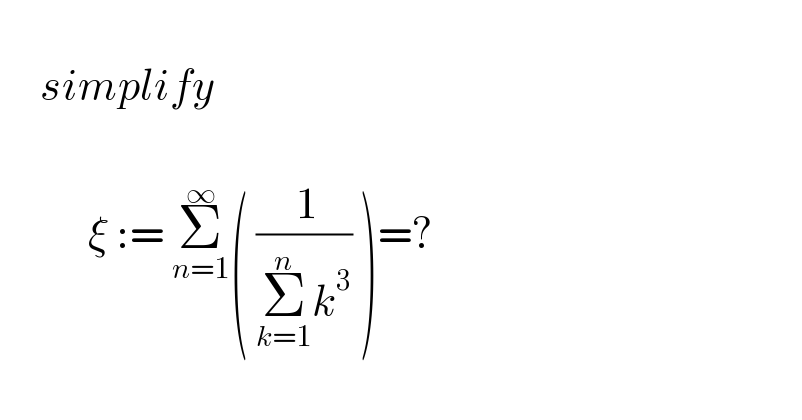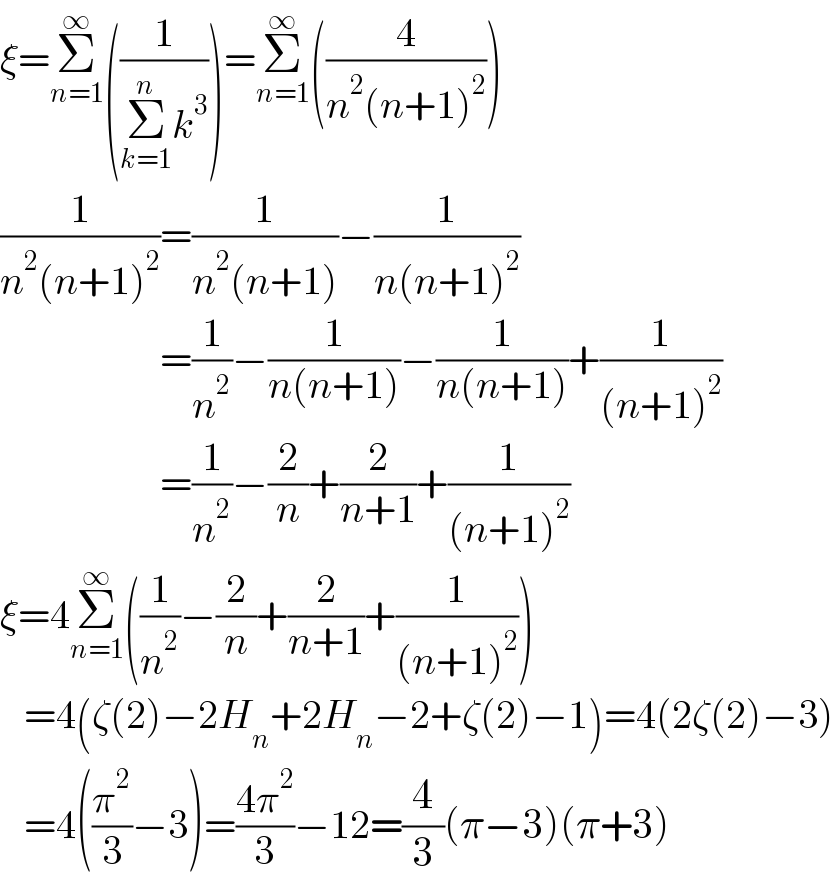Question Number 159465 by mnjuly1970 last updated on 17/Nov/21

$$ \\ $$$$\:\:\:\:\:{simplify} \\ $$$$ \\ $$$$\:\:\:\:\:\:\:\:\:\:\:\xi\::=\:\underset{{n}=\mathrm{1}} {\overset{\infty} {\sum}}\left(\:\frac{\:\mathrm{1}}{\underset{{k}=\mathrm{1}} {\overset{{n}} {\sum}}{k}^{\mathrm{3}} }\:\right)=? \\ $$$$ \\ $$
Answered by Ar Brandon last updated on 17/Nov/21

$$\xi=\underset{{n}=\mathrm{1}} {\overset{\infty} {\sum}}\left(\frac{\mathrm{1}}{\underset{{k}=\mathrm{1}} {\overset{{n}} {\sum}}{k}^{\mathrm{3}} }\right)=\underset{{n}=\mathrm{1}} {\overset{\infty} {\sum}}\left(\frac{\mathrm{4}}{{n}^{\mathrm{2}} \left({n}+\mathrm{1}\right)^{\mathrm{2}} }\right) \\ $$$$\frac{\mathrm{1}}{{n}^{\mathrm{2}} \left({n}+\mathrm{1}\right)^{\mathrm{2}} }=\frac{\mathrm{1}}{{n}^{\mathrm{2}} \left({n}+\mathrm{1}\right)}−\frac{\mathrm{1}}{{n}\left({n}+\mathrm{1}\right)^{\mathrm{2}} } \\ $$$$\:\:\:\:\:\:\:\:\:\:\:\:\:\:\:\:\:\:\:\:=\frac{\mathrm{1}}{{n}^{\mathrm{2}} }−\frac{\mathrm{1}}{{n}\left({n}+\mathrm{1}\right)}−\frac{\mathrm{1}}{{n}\left({n}+\mathrm{1}\right)}+\frac{\mathrm{1}}{\left({n}+\mathrm{1}\right)^{\mathrm{2}} } \\ $$$$\:\:\:\:\:\:\:\:\:\:\:\:\:\:\:\:\:\:\:\:=\frac{\mathrm{1}}{{n}^{\mathrm{2}} }−\frac{\mathrm{2}}{{n}}+\frac{\mathrm{2}}{{n}+\mathrm{1}}+\frac{\mathrm{1}}{\left({n}+\mathrm{1}\right)^{\mathrm{2}} } \\ $$$$\xi=\mathrm{4}\underset{{n}=\mathrm{1}} {\overset{\infty} {\sum}}\left(\frac{\mathrm{1}}{{n}^{\mathrm{2}} }−\frac{\mathrm{2}}{{n}}+\frac{\mathrm{2}}{{n}+\mathrm{1}}+\frac{\mathrm{1}}{\left({n}+\mathrm{1}\right)^{\mathrm{2}} }\right) \\ $$$$\:\:\:=\mathrm{4}\left(\zeta\left(\mathrm{2}\right)−\mathrm{2}{H}_{{n}} +\mathrm{2}{H}_{{n}} −\mathrm{2}+\zeta\left(\mathrm{2}\right)−\mathrm{1}\right)=\mathrm{4}\left(\mathrm{2}\zeta\left(\mathrm{2}\right)−\mathrm{3}\right) \\ $$$$\:\:\:=\mathrm{4}\left(\frac{\pi^{\mathrm{2}} }{\mathrm{3}}−\mathrm{3}\right)=\frac{\mathrm{4}\pi^{\mathrm{2}} }{\mathrm{3}}−\mathrm{12}=\frac{\mathrm{4}}{\mathrm{3}}\left(\pi−\mathrm{3}\right)\left(\pi+\mathrm{3}\right) \\ $$
Commented by mnjuly1970 last updated on 17/Nov/21

$$\:\:\:{thanks}\:{alot}\:{sir}\:{brandon}.{mercey} \\ $$
